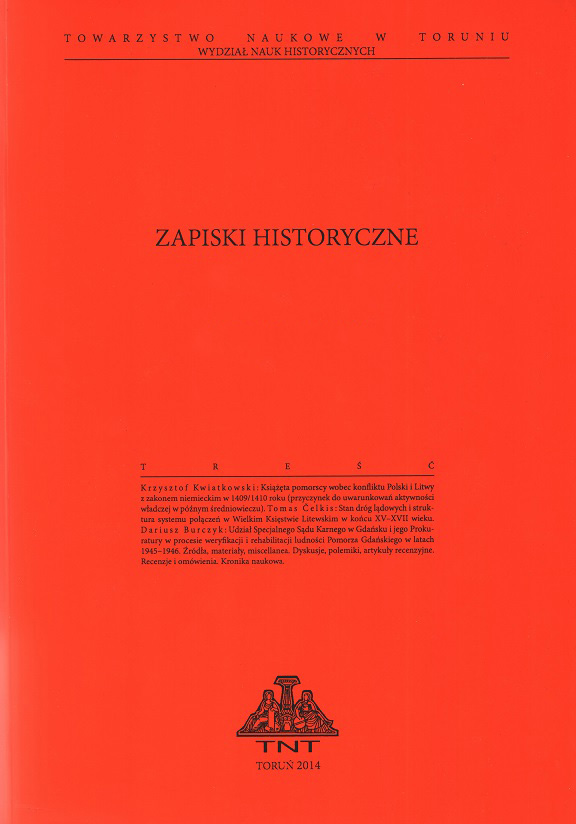Problem tożsamości i poczucia lojalności Żydów pochodzących z zaboru pruskiego na przykładzie Alfreda Cohna (1901–1961)
The Problem of Identity and the Sense of Loyalty of Jews Coming from the Prussian Partition on the Example of Alfred Cohn (1901–1961)
Author(s): Elżbieta AlabrudzińskaSubject(s): Local History / Microhistory, Social history, Interwar Period (1920 - 1939), WW II and following years (1940 - 1949), Post-War period (1950 - 1989), Fascism, Nazism and WW II, History of the Holocaust, History of Antisemitism
Published by: Towarzystwo Naukowe w Toruniu
Keywords: West Prussia; Greater Poland; German Jews; emancipation; acculturation; assimilation; national identity; loyalty to the state;Polish-Jewish relations;
Summary/Abstract: So far a very simplified picture of the transformation of the identity of Jews of West Prussia and Poznan land have functioned in the literature on the subject. The impulse to conduct the research on this issue became the publishing of the memories of Alfred Cohn, a typical German Jew, whose life and dramatic decisions show the complexity of the problem of identity and the sense of loyalty of the Jewish population of the territory of the Prussian partition. Alfred Cohn was close to recognizing himself as a German of the Jewish denomination. In 1920, without a shade of doubt, he decided to maintain loyalty to the German state and leave his family town Bydgoszcz, while in 1945 he decided the opposite. In order to clarify these contradictions, an analysis of the emancipation, acculturation and assimilation processes of the Jewish community of the territories of the Prussian partition of the 19th century and the first two decades of the 20th century was conducted. Subsequently, the results of this analysis were compared with studies on the identity of German Jews living in the Second and Third Reich. At least until the 1880s, the Jews of Greater Poland, and West Prussia considered themselves representatives of a separate nation, despite the already advanced process of assimilating German culture, customs and language, and showing loyalty to the German state. The assimilation reached its greatest intensity at the turn of the 19th and 20th centuries, leading to a strong integration of Jews with German society and the German state. This aggravated Polish-Jewish antagonism, especially in Greater Poland. After some of the lands of the former Prussian partition came under Polish rule, most Jews remained loyal to the German state, treating it as their homeland, and emigrated in the years 1918–1921 along with the majority of the German population. However, despite such decisions, despite the use of German as their mother tongue, and despite demonstrating German patriotism and the intense desire to blend in with German society, it is necessary to show great caution in the case of attempts to recognize the Jews of the Prussian partition only as a religious minority, although more than once they have defined themselves this way. In the Reich, Jews did not manage to merge with the German environment, either. They created their own Jewish-German cultural system. Their identity can be described as very specific, heterogeneous and shaped by contradictions and dilemmas. In the territories of the Prussian partition, the process of shaping the identity of German Jews was even more complicated as this community had to function also within the Polish society.
Journal: Zapiski Historyczne
- Issue Year: 84/2019
- Issue No: 3
- Page Range: 101-122
- Page Count: 22
- Language: Polish

